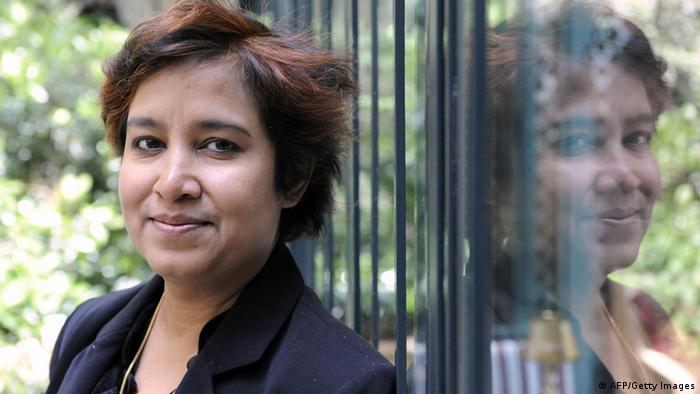Bangladeshi author Taslima Nasreen, known for her writings on oppression against women and her unwavering criticism of religion, tells DW that Islamic fundamentalism in Bangladesh has become stronger and more political.
For the past 21 years, Nasreen has been living in exile in various countries, including India, Sweden, Germany and the United States.
Due to her criticism of Islam, multiple fatwas have been issued against the author calling for her assassination. Still, 53-year-old Nasreen doesn't mince her words when she talks about freedom of expression and the rise of religious fundamentalism in Bangladesh.
The South Asian nation has been afflicted by rising Islamist violence in recent months. Extremists have been blamed for the killings of at least four atheist bloggers and a publisher since the start of this year.
In an exclusive DW interview, Nasreen, who recently returned to India from the US, talks about the shrinking space for free thinkers in Bangladesh and said that Islam cannot be exempt from the critical scrutiny that other religions go through.
Nasreen also believes Bangladesh will be headed for a complete disaster if the government fails to bring Islamic terrorists to justice.
DW: Has religious fundamentalism in Bangladesh become stronger and more powerful now as compared to the time when you lived in the country - especially against the backdrop of the recent killings of bloggers, writers and publishers?
Taslima Nasreen: I think so. When I lived in Bangladesh, hundreds of thousands of fundamentalists called for my assassination because I criticized Islam. Now young writers and bloggers, who are critics of Islam, are being hacked to death by Islamic terrorists.
The Islamization of Bangladeshi society began in the 1980s. Vast sums of money from the Middle East have been sent to make Bangladeshi Muslims more radical. Numerous mosques and madrasas (institutions of Islamic religious studies) have been built in the country for indoctrinating young boys and converting them into terrorists.
These mosques and madrasas are breeding grounds for Islamic fundamentalists and terrorists.
In the 1970s and 80s, there weren't many Bangladeshi girls and women wearing hijabs and burqas. But in recent years, the extremist Wahhabi culture has unfortunately invaded Bangladesh. And it has replaced an innocent form of Islam that was practiced by my grandparents with political Islam, which is really unfortunate.
The current ruling party, the Awami League, is considered to be a secular outfit. But how come fundamentalists are gaining such power in the country?
The Awami League is no more a secular party. It is more like the Islamist party, Jamaat-e-Islami. The Awami League has a group under the name ulema league, which is comprised of Islamic fundamentalists who approve the killing of free thinkers and liberals.
Members of Jamaat-e-Islami have been joining the Awami League because they share more or less the same ideology.
Prime Minister Sheikh Hasina has not issued any statement so far against the brutal killings of progressive and secular writers.
Instead, she warned free thinkers that they must not cross the limit and hurt the religious feelings of people. Her government passed a law which is against freedom of expression. Atheist writers and bloggers are increasingly becoming victims of a dangerous provision of Section 57 of the Information and Communication Technology Act.
Many suggest that at present the main conflict in Bangladesh is between pro and anti-independence forces. And that it has escalated with the start of the war crimes tribunals. Do you agree?
Not really. Many pro-independence forces are also against the atheist bloggers and writers. All pro-independence people are not necessarily free thinkers. They advocate punishing both the war criminals as well as the atheists.
The current conflict in Bangladesh is basically between secularism and fundamentalism. It's between rational thinking and irrational blind faith, between humanism and barbarism, between those who value freedom and those who do not.
There have been reports suggesting that fundamentalism is also on the rise in India. What is your view on this?
I have been witnessing the rise of fundamentalism in India. Rationalists have been assassinated by Hindu fanatics. Four people have so far been killed over the issue of beef. I cannot be proud of this intolerant India, and I hope good sense will prevail.
You said a majority of Indian intellectuals are hypocritical as they did not speak up when Muslim fanatics attacked you. Do you still hold this view?
I did not say Indian intellectuals are hypocritical. I said pseudo secular people who speak against Hindu fundamentalists but not against Muslim fundamentalists are hypocritical.
I respect intellectuals in India. They are against all kinds of fundamentalism. It is true many writers and artists who call themselves secular did not defend me when I was attacked by Muslim fundamentalists.
They believe it is their duty to defend Muslims in India as Muslims are a minority. It is fine, but I don't understand why they think they should defend minority fundamentalism. There is no difference between minority religious fundamentalism and majority community's religious fundamentalism.
You said there is "idiocracy" in Bangladesh, not democracy. Why?
If they were not idiots, they wouldn't have created laws based on misogynistic religion but based on equality and justice. They would have science-based education rather than religion-based education. Now Bangladesh is full of idiocy and theocracy. I have lost all hopes for that country.
If you hadn't left Bangladesh, do you believe fundamentalists would have killed you?
Yes, of course. I have been living in exile for a long time. The Islamic fanatics are still after me; they have made a new global hitlist. My name also figures in this list.
Taslima Nasreen is an award-winning Bangladeshi writer and human rights activist. She is known for her writings on women's rights and criticism of religion.


No comments:
Post a Comment